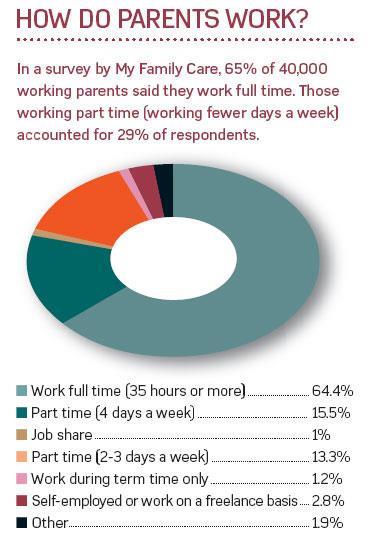IF YOU READ NOTHING ELSE, READ THIS…
- Providing family-friendly voluntary benefits helps to retain staff.
- Parental coaching is a growing trend among employers that are keen to retain their top talent.
- Childcare vouchers are a popular benefit to support working parents.
Childcare has been identified as a key priority for the government over the next couple of years. However, there has been little detail on its strategy so far, other than a rumbling about a policy to allow working parents to claim up to £2,000 a year per child from their tax bills to fund childcare.
The policy, which the government had not confirmed at the time of writing, would be welcome news after the cut in child benefit for households in which one person earns more than £50,000, which took effect on 7 January.
Of course, employers need to play their part in supporting working families too, and voluntary benefits can help them do so without creating an extra cost for their business.
Childcare vouchers
Childcare vouchers are the most obvious and cost-effective form of voluntary benefits support for parents, as well as one of the most popular. They are typically offered through salary sacrifice arrangements. Providers include Busy Bees, Computershare Voucher Services, Fideliti and KiddiVouchers.
But employers must be aware of the legal implications of offering childcare vouchers. Kim Honess, head of flexible benefits at Mercer, says: “There are still a lot of [employers] that are battling with the fact that childcare vouchers, although a very good benefit, do have to continue during maternity or paternity leave.”
This can prove expensive, particularly for staff who are off work for up to a year and take the maximum amount of vouchers, she says.
Shared parental leave
Employed mothers are entitled to 52 weeks’ maternity leave. However, reforms brought in by deputy prime minister Nick Clegg in November will allow working parents to share their leave from 2015, when fathers will also be able to take unpaid leave to attend two antenatal appointments.
Honess adds: “Everyone has the right to request flexible working and employers have to consider any such requests, although they don’t have to grant them.”
Martha How, principal at Aon Hewitt, says employers are wary of flexible working because of the complexities of managing a variety of working patterns, but they remain interested in the benefit. But implementation must be meaningful, she says. “The natural extension to flexible benefits is flexible working and not just having flexible hours. Flexible working is about term-time working, nine-day fortnights, and much more variety.”
Emergency childcare is another matter for employers to consider, although this tends to be offered as an employer-funded benefit. Mercer’s Honess says: “We have suggested [emergency childcare] as a flexible benefit where people buy a certain number of emergency days a year, but it’s tricky to do that when staff don’t know how many they might need. I think it works better as a employer offered benefit.”
Coaching services
Coaching services for expectant and new parents are a growing trend, with workshops and webinars offered by providers such as Employees Matter, My Family Care and Talking Talent, a well as Gingerbread, which runs courses for single parents.
Zoe Sinclair, founder of Employees Matter, says: “These services come from the understanding that someone comes to work as a parent and not just an employee. It is a very good way for [employers] to offer support. It’s just that they are not paying for it; they are just providing a room.”
Other voluntary benefits for working parents include discount vouchers, which employees can use to fund everyday expenditure, such as groceries.
Julian Forster, managing director of Computershare Voucher Services, says: “If there is an opportunity to save a little bit of money against something that people do regularly, like shopping in supermarkets or their general high-street spend, that has got to be very welcome for families who are not going to get a pay rise or whose benefits are not going to keep up with their costs.”
But whatever voluntary benefits an employer offers working parents, something is far better than nothing at all. Chris Parke, chief executive officer at Talking Talent, says: “If an employer is serious about engaging, retaining and developing working parents so they can realise their full potential, offering support is really important. Parenthood is a critical time in people’s career and lives and to give them more support than the traditional likes of childcare vouchers is key.”


VIEWPOINT
Alex Fricke: Voluntary benefits motivate working parents
Some employers also run parents’ networks or seminars, offer maternity coaching and have a dedicated parent and child room on-site.
Voluntary benefits such as these help employers to recruit, motivate and retain working parents. Childcare vouchers can be offered through a salary sacrifice arrangement, which affords advantages in tax and national insurance contributions for both employers and employees.
There is no obligation for employers to provide these benefits, but employers are required to provide suitable facilities for pregnant women and nursing mothers to rest.
Further, it is best practice to remind employees about the benefits available before they go on parental leave or after they return.
For employee benefits schemes to be successful and staff engagement to be high, it is important for employers to stress the supportive nature of such schemes. From a technical perspective, it is likely to be necessary for employers to continue to provide childcare vouchers to women on maternity leave and parents on adoption leave or additional paternity leave in addition to statutory maternity leave. This may add unforeseen costs to the scheme.
Other voluntary non-cash benefits should also continue to be made available to employees who are on parental leave, in order to avoid any claims of indirect sex discrimination.
If a subsidised emergency childcare service is offered, this should be signposted in any policy dealing with employees’ rights regarding time off for their dependants.
Alex Fricke is associate, employment, pensions and benefits at Freshfields Bruckhaus Deringer

CASE STUDY: DELOITTE
Parental perks add up
Flexible working and the ability to buy up to five days’ leave on top of their 25 days’ annual leave are valuable benefits for working parents at Deloitte.
Equally popular is a dedicated support network through which working parents can connect with each another across the accountancy firm, plus a parenting intranet site that carries useful information for working families. Childcare vouchers are available through provider Edenred.
Following a provider switch from Bright Horizons to My Family Care last year, Deloitte’s staff now have access to extra school holiday and elder care cover, as well as emergency childcare cover.
Deloitte also offers employer-funded support, including enhanced maternity pay. Last year, it replaced a £6,000 return-to work bonus for new mothers with a pay structure that sees staff on maternity leave receive statutory maternity pay (SMP) plus full pay during their first 16 weeks’ leave; 50% of pay in weeks 17 to 26; and SMP for weeks 27 to 39, subject to certain eligibility criteria.
This change was in response to staff feedback, which suggested the cash would be more useful from the outset of employees’ leave.
Stevan Rolls, head of HR at Deloitte, says: “Every organisation will tell you that retaining talented women and working parents provides challenges. For us, the key thing is we want to hold on to our best people, we want to make it as easy as possible for them to be able to run their lives outside of work as well as inside of work, and this package of benefits helps them to do just that.”











